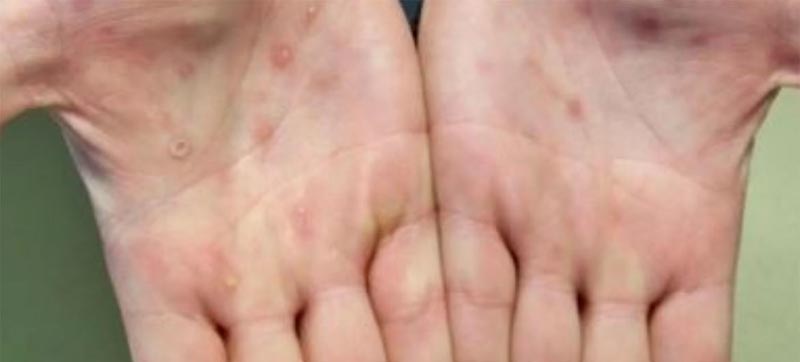Emergency Committee experts advise against issuing the highest level of health alert, but are deeply concerned about the scale and speed of the current outbreak and point to many unknowns and gaps in current data.
The Emergency Committee of the World Health Organization (OMDS) considers that the monkeypox outbreak does not constitute, at the moment, a public health emergency of international concern.
After a three-day meeting, the Committee resolved by consensus to advise the Director General of the Organization not to declare the highest level of alert according to international health regulations, although “some members expressed different opinions.”
So far, monkeypox has been detected in 50 countries, across all regions, with 3,000 cases since early May.
However, the Committee unanimously recognizes that the outbreak constitutes an emergency and that controlling it will require an “intense” response. Experts advise monitoring the situation closely and reviewing it after a few weeks, once more information is available about the current unknowns, to determine if there have been significant changes that may warrant reconsidering the decision.
“The Emergency Committee shared its serious concern about the scale and speed of the current outbreak, pointed out many unknowns and gaps in current data and prepared a consensus report that reflects the different opinions of the committee,” said Dr. Tedros Adhanom Gebreyesus, the director general of the Organization in a statement “They advised me that at this time the event does not constitute a public health emergency of international concern, which is the highest level of alert that the WHO can issue, but they recognized that the call of the committee itself reflects the growing concern about the international spread of monkeypox.”
Tedros added that the WHO is following the assessment of the disease “very closely.” “What makes the current outbreak especially worrying is the rapid and continued spread to new countries and regions, and the risk of sustained new transmission in vulnerable populations, such as immunocompromised people, pregnant women and children,” he explained. .

Monkeypox lesions usually appear on the palms of the hands
Unusual aspects and knowledge gaps
The Committee notes that many aspects of the current multinational outbreak of monkeypox virus are unusual , such as the emergence of cases in countries where circulation had not previously been documented, and the fact that the vast majority of cases were observe among men who have sexual relations with men, of young age, not previously immunized against smallpox (knowing that vaccination against smallpox is effective in also protecting against monkeypox).
Some members suggested that, given the low level of population immunity against smallpox virus infection, there is a risk of transmission in the general population that should not be overlooked. The Committee also highlights that monkeypox virus activity has been neglected and not well controlled for years in African countries.
Other knowledge gaps and areas of uncertainty, on which more information is needed to support a more complete assessment of the public health risk of this event, are: modes of transmission; the full spectrum of clinical presentation; the infectious period; reservoir species and the potential for reverse zoonosis; and access to vaccines and antivirals and their effectiveness in humans.
The monkeypox virus is most often spread through direct contact with the rash or sores of someone who has the virus.
It can also spread through contact with clothing, bedding and other items used by a person for the disease, or through respiratory droplets that can be transmitted through prolonged face-to-face contact. The risk of aerosol transmission is not yet fully known. The WHO recommends that healthcare workers caring for monkeypox patients wear a mask.
Symptoms usually begin seven to 14 days after exposure, but in some cases they may not appear until 21 days . The most common symptom is a rash or sores on the skin. Flu-like symptoms may also occur, such as fever, swollen lymph nodes, headache, and tiredness. In some cases, monkeypox can cause serious illness.
The UN agency does not recommend mass vaccination against monkeypox. In the few places where vaccines are available, they are being used to protect those who may be exposed, such as health care workers and laboratory personnel.
Factors to reconsider the decision
The Committee explains a number of factors that should prompt a reassessment of the situation:
- Increase in the growth rate of reported cases in the next 21 days.
- Emergence of cases among sex workers.
- Significant spread in additional countries or significant increases in the number of cases and spread in endemic countries.
- Increase in the number of cases in vulnerable groups, such as immunosuppressed people, pregnant women and children.
- Increased severity in reported cases (i.e. increased morbidity or mortality and hospitalization rates).
- Tests for reverse propagation to the animal population.
- Significant changes in the viral genome that lead to increased transmissibility, virulence or immune escape properties, or resistance to antivirals.
- Cases associated with higher virulence clades detected in new countries outside West and Central African countries.
Outbreak response
The Committee insists that the response to the outbreak “requires collaborative international efforts.”
Experts are concerned about the possibility of worsening stigmatization and violation of the rights of affected groups, “which would make the response even more difficult.” Additionally, some Committee members said that laws and practices that criminalize or stigmatize same-sex sex “create barriers to access to health services and may also hinder response interventions.”
WHO says it is “urgent” for all Member States, communities and individuals to adopt the committee’s recommendations to intensify surveillance, improve diagnosis, community participation and risk communication, and the appropriate use of treatments, vaccines and public health measures, including contact tracing and isolation.
Since the monkeypox outbreak became known on May 7, the WHO has issued clinical guidance and convened hundreds of scientists and researchers to accelerate research. It has also met with community members and LGBTQI+ organizations so that health information and advice on protective measures is shared effectively around mass gatherings.
















